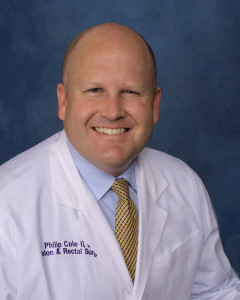
Colon cancer affects more than 140,000 Americans each year and is the second most common cause of cancer death in the United States. Improvements in screening and treatment are helping to lower this number, but there are still far too many patients that put off screening and needlessly delay their treatment. If everyone 50 or older had regular screening tests, as many as 60% of deaths from colorectal cancer could be prevented, according to the Centers for Disease Control.
The United States Preventive Services Task Force recommends screening for average risk patients beginning at age 50. Patients with a family history of colorectal cancer or polyps should undergo screening beginning at age 40. Factors associated with increased risk of colon cancer include advanced age, family history, male gender, obesity, smoking and alcohol use.
Screening can be accomplished by several methods. Colonoscopy is the preferred screening modality, but patients must weigh the risks and benefits of this procedure versus other methods. Other screening options include: flexible sigmoidoscopy, fecal occult blood testing, barium enema and CT colonography.
Colonoscopy is considered the gold standard for colorectal cancer screening. It is highly sensitive in the detection of polyps and cancers, and also allows for polyp removal or tumor biopsy during the procedure. It is usually performed as an outpatient procedure and is generally well tolerated. Patients are required to drink a bowel prep during the day prior to the procedure and are able to resume their regular diet and activities shortly following the colonoscopy.
Many patients delay screening because of concerns about discomfort during the procedure or the bowel prep involved. There have been marked improvements in these areas in recent years. Many centers now utilize anesthesiologists in an effort to ensure safe and adequate anesthesia for the procedures. Bowel preps have evolved and are now much lower in volume and easier to take. Embarrassment also keeps some people from undergoing screening.
March is Colon Cancer awareness month. There is no better time to discuss colon cancer screening with your doctor. Ask questions. Get answers. Get screened.









